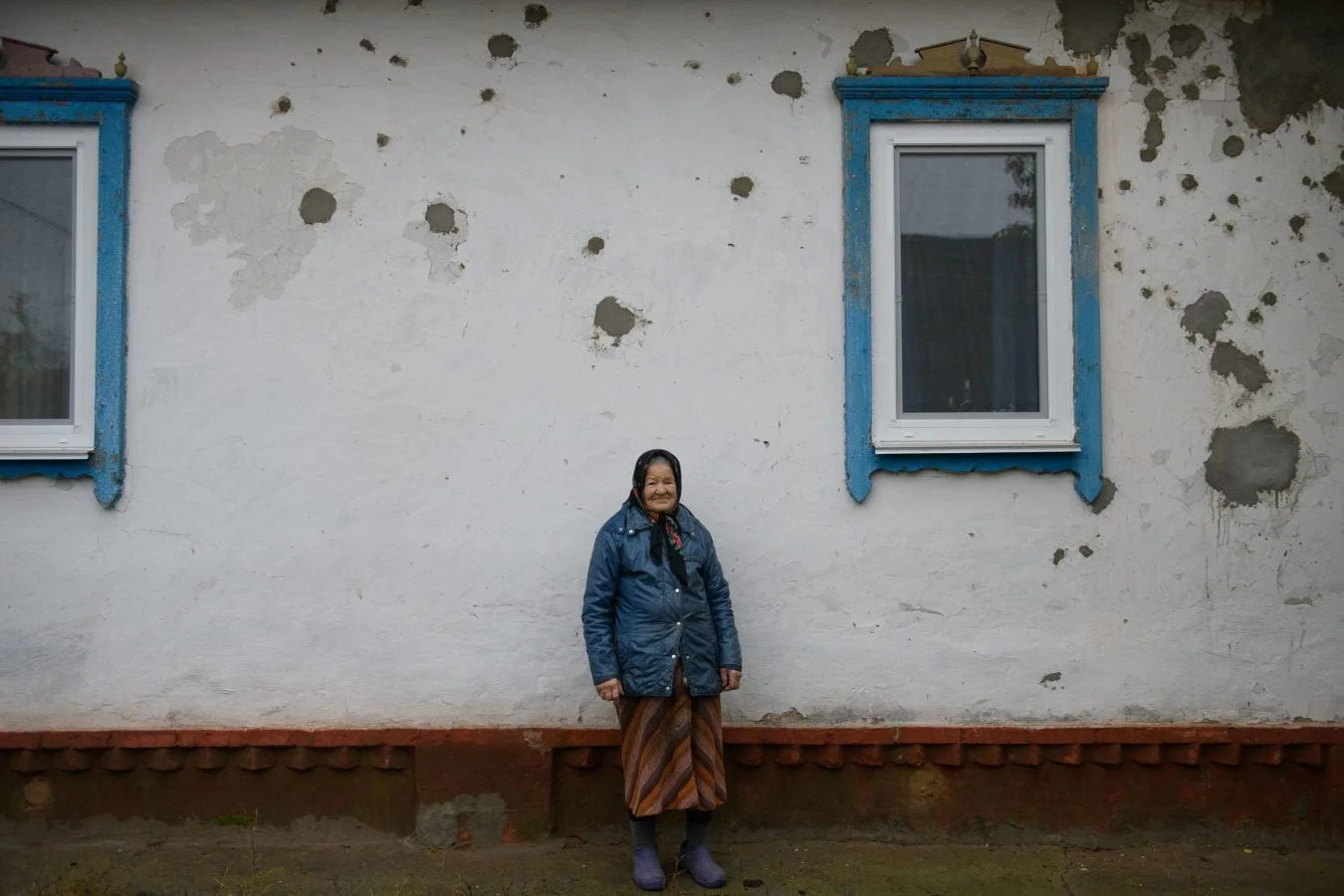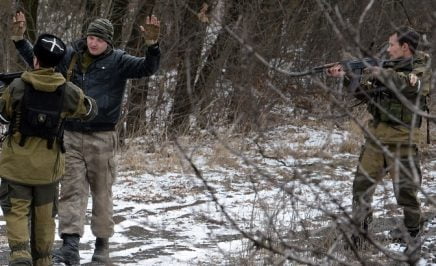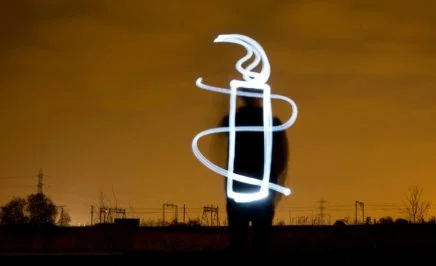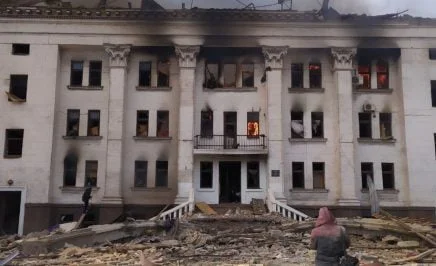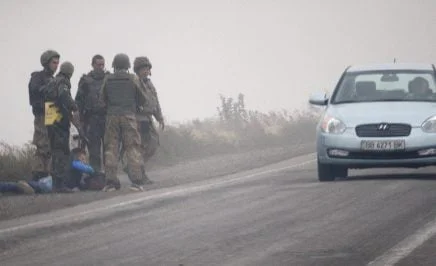- Older people killed and injured at higher rates than other groups
- Older people living in damaged houses and dangerous conditions
- Russia’s invasion has led to thousands of displaced older people living in overstretched state institutions
Older people in Ukraine have been disproportionately impacted by death and injury during Russia’s invasion and are unable to access housing on an equal basis with others after being displaced, Amnesty International said in a new report today.
The report, ‘I used to have a home’: Older people’s experience of war, displacement, and access to housing in Ukraine, documents how older people often remain in or are unable to flee conflict-affected areas, exposing them to harm and dangerous living conditions in severely damaged housing. Those who do flee often cannot afford to cover rental costs, while thousands have had to stay in overstretched state institutions, which do not have enough staff to provide the necessary level of care.
Russia’s invasion of Ukraine, which has had a devastating impact on civilians of all ages, threatens the physical security of older people and has forced millions from their homes. Ultimately, the most expedient way to protect the rights of older civilians in Ukraine is for Russia to end its unlawful war.
“Russia’s devastating invasion is having a disproportionate impact on older people in Ukraine, with many staying behind in areas where they regularly come in harm’s way from relentless ground and air attacks.” said Laura Mills, researcher on older people and people with disabilities at Amnesty International.
“Older people are often either staying in unsafe homes or, when they are able to flee, end up in shelters that do not have adequate resources to meet their needs, particularly if they have disabilities.
Laura Mills, researcher on older people and people with disabilities at Amnesty International
From there, they risk being placed in state institutions. As the harsh grip of winter takes hold, the international community must urgently take action to bolster support for this group.”
The Ukrainian government has made significant efforts to evacuate people from conflict-affected areas, including by announcing the mandatory evacuation of around 200,000 people from Donetsk region in July.
The cost and logistics of ensuring housing for older people displaced by the war, however, should not be Ukraine’s alone. Amnesty International is calling on other countries to facilitate the evacuation of older people — with special attention paid to older people with disabilities — to accessible accommodation abroad where possible.
International organizations should do more to financially support older people so that they can afford to rent homes and, working together with the Ukrainian authorities, include them among those prioritized for placement in any newly-built accommodation.
Disproportionate risks
In Ukraine, people over 60 years old comprise nearly one-fourth of the population. Older people are disproportionately vulnerable to attacks: according to the UN Office of the High Commissioner for Human Rights (OHCHR), which collects data on civilian casualties in Ukraine, people over 60 made up 34% of civilians killed from February to September 2022 for cases in which an age was recorded.
Older people, who more frequently have health conditions, are also at a greater risk in occupied areas, where Russian forces have severely restricted the access of humanitarian aid, in flagrant violation of international law.
Svitlana, 64, who was in a Russian-occupied village near Kharkiv, said that her 61-year-old brother collapsed from a stroke in April 2022. He was hospitalized, but the hospital did not have electricity or running water. He was discharged the next day.
“They couldn’t do anything, they couldn’t do an electrocardiogram, they couldn’t do an encephalogram, they had no medications,”
Svitlana, 64 years old
Less than a week later, her brother died from a second stroke, according to a death certificate seen by Amnesty International.
Displacement and rising institutionalization
Many displaced older people have struggled to find suitable accommodation. Pushed out of the private market by increased rental prices and pensions that are well below subsistence levels, many older people are at heightened risk of losing access to housing altogether.
Nina Silakova, 73, who was displaced from Luhansk region, was evicted twice from rental apartments: once in August after she had a heart attack and her landlady feared having to care for her, and again in October.
Nina was worried she wouldn’t be able to find a third apartment:
“There are no places for that price in the city because there are so many [displaced people]… I don’t know where to turn… Should I go out into the street, stand there and ask people? People will just pass by and think I am an ill old grandmother.”
Nina Silakova, 73, who was displaced from Luhansk region
Amnesty International found that shelters were often physically inaccessible to older people with disabilities and did not have enough staff to support them. As a result, older people with disabilities often had no choice but to live in a state institution.
Between February and July 2022 alone, at least 4,000 older people were placed in state institutions after losing their homes during the conflict, according to statements released by Ukraine’s Ministry of Social Policy.
Olha Volkova, who runs a shelter for displaced older people with disabilities in Dnipro, said: “About 60% of the people [get sent to institutions]. They can’t afford to rent housing, to pay for utilities, to eat. And so we have to send them to nursing homes.”
Amnesty International visited seven institutions for older people and people with disabilities in Ukraine, and found these facilities were unable to provide the requisite level of care – particularly for older people with limited mobility – in part because they do not have enough staff to care for them.
Independent Ukrainian monitors reported that such conditions were common before the invasion, which has only exacerbated staffing shortages.
“They turn me over only once when they change my diaper in the morning, once when they change my diaper in the evening… We’re abandoned here,” said Liudmyla, 76, who lives in an institution in Kharkiv region.
“In a nursing home there is basically no rehabilitation…. A person will lie down there until they die.”
Olha Volkova
As Russia’s war on Ukraine continues, civilian infrastructure and services have come under intense pressure. However, the Ukrainian government must do all it can to ensure monitors are able to access state institutions, and ensure that older people living in them are among those prioritized for alternative housing as soon as it becomes available.
Dangerous housing
Some older people have chosen to stay behind in their homes. Others told Amnesty International that they were unable to flee because information about evacuations was less accessible to them.
Liudmyla Zhernosek, 61, lives in Chernihiv with her 66-year-old husband, who uses a wheelchair. She said: “I saw every day younger people walking alongside my building with backpacks on. Only later I found out from others in the stairwell that they were going to the centre of the city, there were still evacuations from there. But that would have been 40 minutes on foot, I couldn’t get there with my husband. “
“Nobody told us about evacuations, I always found out only afterwards.”
Liudmyla Zhernosek, 61, Chernihiv
Amnesty International also documented older people living in housing without electricity, gas or running water. Windows or roofs damaged during the conflict no longer provided protection from rain, snow or cold temperatures.
When Amnesty International interviewed Hanna Selivon, 76, in Chernihiv, only the bathroom, where volunteers had put a mattress in the bathtub to allow her to sleep, had covering overhead.
Hanna said: “Everyone on our street left. The only people left were me and two other older women… One had a disability. We just had nowhere to go. I would hide in a hole in my cellar… On 29 March, there was a lot of shelling, and when I came out [from the cellar] I just saw that flames were flying… that [my house] was burning. My legs wouldn’t move.”
Amnesty International is calling on governments and international organizations to step up support for older people in Ukraine by facilitating the voluntary evacuation of older people abroad, ensuring that older people are among those prioritized in cash assistance, and by supporting the creation of physically accessible housing for older people with disabilities.
“As the freezing winter months have arrived, older people must be evacuated to accessible shelters, and the repair of their homes must be prioritized.”
Laura Mills, researcher on older people and people with disabilities at Amnesty International
Methodology
Amnesty International interviewed 226 people for this report, including during in-person visits to seven state institutions. The research was carried out between March and October 2022, and included a four-week trip to Ukraine in June and July 2022.
Accountability for war crimes
Amnesty International has been documenting war crimes and other violations of international humanitarian law committed during Russia’s war of aggression in Ukraine. All of Amnesty International’s outputs are available here.
Amnesty International has repeatedly called for members of Russian forces and officials responsible for the aggression against Ukraine and for violations of international law to be held to account, and has welcomed the ongoing International Criminal Court investigation in Ukraine. Comprehensive accountability in Ukraine will require the concerted efforts of the UN and its organs, as well as initiatives at the national level pursuant to the principle of universal jurisdiction.
Latest updates:
- News: Russian attacks on Kyiv and cities across Ukraine are an escalation of aggression and apparent violations of laws of war
- News: More than 1,300 protestors detained after Putin’s partial military draft
- Report: Deadly Mariupol theatre strike in Ukraine ‘a clear war crime’ by Russian forces
- Explainer: How Amnesty verifies military attacks in Ukraine
- News: UN Security Council must prioritize accountability for Russian war crimes in Ukraine
Amnesty International is a global movement of 10 million people standing up for justice, freedom and equality. Together, our voices challenge injustice and are powerful enough to change the world. Learn more about what we do, our crisis response work, and our campaign to raise the humanitarian intake.
